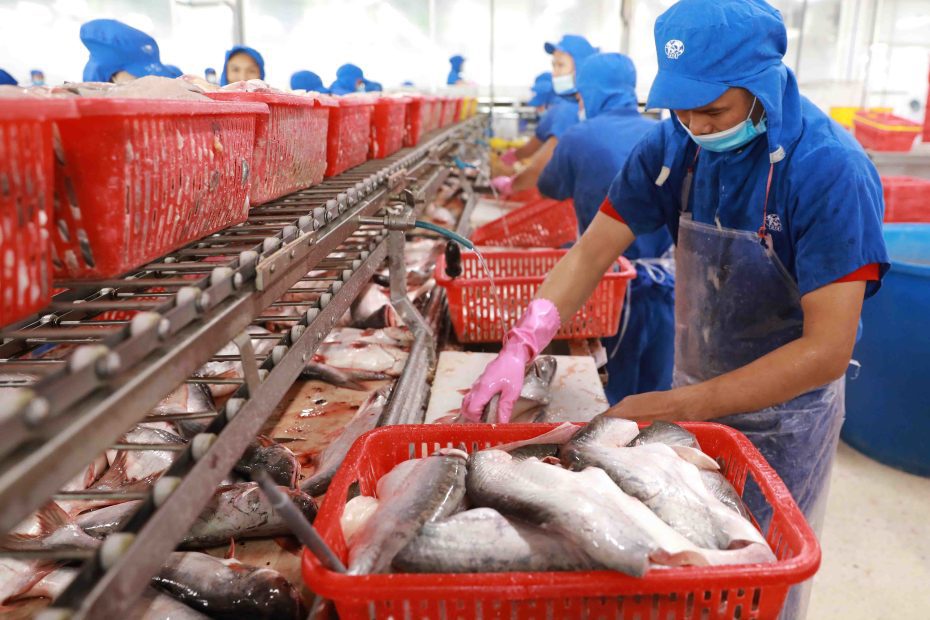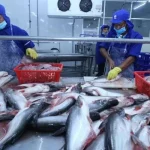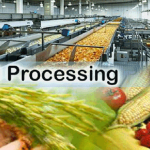If you’re looking for exciting employment opportunities in the fish processing industry, this post is for you. We’ll explore the ins and outs of working as a fish processing work in the UK, with a focus on how visa sponsorship can make it possible for you to pursue your career goals.
The best part is that prior experience or education may not always be required for these opportunities, so let’s dive in!
Overview of Fish Processing Worker Jobs in the UK
Fish processing workers play a vital role in the seafood industry, ensuring that fish and seafood products are prepared, packaged, and maintained to meet industry standards.
In the UK, there is a high demand for fish processing workers, driven by the country’s thriving seafood industry and increasing consumer demand for fresh and processed fish products.
The UK has a rich and diverse fishing industry, with coastal regions and fishing ports scattered throughout the country. This industry relies on skilled workers to handle the processing and preparation of fish and seafood for distribution and consumption.
As a fish processing worker, you would be involved in a range of tasks, including filleting, packing, quality control, and maintaining hygiene standards.
Filleting fish involves carefully removing the bones and preparing the fish for further processing or sale. This requires precision and skill to ensure that the fillets are of high quality and meet customer expectations.
In addition to filleting, you will be involved in packing and packaging fish products. You will carefully weigh portions, and package fish to be sold in various formats, such as fresh, frozen, or smoked.
Attention to detail is crucial during this process to ensure accurate labeling, proper storage conditions, and compliance with food safety regulations.
Types of Fish Processing Worker Jobs in the UK: Types and Opportunities
When it comes to fish processing worker jobs in the UK, there are various types and opportunities available within the seafood industry.
These roles cater to different aspects of fish processing, ensuring the efficient and high-quality production of fish and seafood products.
Let’s explore some of the common types of fish processing worker jobs you can find in the UK:
1. Filleters:
Filleting is a fundamental task in fish processing, and filleters play a crucial role in this process. They specialize in carefully removing the bones and preparing fish fillets.
Would You Like To Apply For This Jobs/Sponsorship?
Enter Your Email Address HERE & You Will Receive a Notification About Your Application. If it shows "Subscribed" CLICK HERE to follow on Telegram for updatesFilleters require precision and skill to ensure that the fillets are of consistent size, shape, and quality. They work with different types of fish species and are responsible for meeting production targets while maintaining product integrity.
2. Packers:
Packers are responsible for the packaging and presentation of fish products. They weigh, portion, and package fish according to specific requirements, whether for fresh sales, freezing, or other forms of packaging.
Packers ensure that the products are accurately labeled, properly sealed, and ready for distribution. Attention to detail is essential to maintain the visual appeal and quality of the packaged fish.
3. Quality Control Inspectors:
Quality control inspectors play a vital role in maintaining the high standards of the fish processing industry. They conduct inspections throughout the processing line, ensuring that the fish meets quality and safety standards.
Inspectors check for freshness, proper handling, and adherence to food safety regulations. Their role is crucial in maintaining product integrity and ensuring that only high-quality fish products reach the market.
4. Machine Operators:
Fish processing involves the use of various specialized machinery and equipment. Machine operators are responsible for operating and maintaining this equipment.
They ensure that the machines are running smoothly, make necessary adjustments, and troubleshoot any issues that may arise. Machine operators play a key role in maintaining efficiency and productivity in the fish processing facility.
5. Hygiene and Sanitation Staff:
Maintaining cleanliness and adhering to strict hygiene standards are paramount in the fish processing industry. Hygiene and sanitation staff are responsible for cleaning and sanitizing the processing areas, equipment, and facilities.
They follow strict protocols to prevent cross-contamination, maintain hygiene standards, and comply with food safety regulations.
6. Supervisors and Managers:
As the fish processing industry expands, there is a need for experienced supervisors and managers who can oversee operations and ensure smooth workflow.
These roles involve supervising a team of fish processing workers, monitoring production targets, maintaining quality control, and managing resources effectively.
Supervisors and managers play a vital role in driving productivity, ensuring compliance, and promoting a safe and efficient work environment.
As you explore fish processing worker jobs in the UK, consider your strengths, preferences, and the specific areas of fish processing that interest you.
Tailor your job search to match your skills and goals, and be open to learning and developing new competencies as you progress in your career.
With visa sponsorship, you can embark on a rewarding journey as a fish processing worker, contributing to the UK’s vibrant seafood industry
Visa Sponsorship for You
If you’re a non-UK resident, visa sponsorship is crucial for pursuing fish processing jobs in the UK. It allows you to obtain the necessary legal permission to work in the country and ensures compliance with immigration laws.
There are different types of visas available for you, such as the Skilled Worker Visa and Seasonal Worker Visa, depending on your specific circumstances and the nature of the job.
Visa sponsorship offers numerous benefits, including legal status, work rights, and access to public services, giving you the peace of mind to pursue your career in the UK.
Fish Processing Jobs in the UK With Visa Sponsorship – APPLY NOW!
1. Fish packer/filleter
- Hiring Company: Shoals on the Lido
- Location: Brixham
- Salary: £450 a week
2. Specialist Fish Filleter
- Hiring Company: Flatfish Limited
- Location: Grimsby DN31
- Salary: £10.96 an hour
3. Food Production Operative
- Hiring Company: CSP Recruitment.
- Location: Grimsby
- Salary: £10.45 – £11.98 an hour
Applying for Visa Sponsorship For Fish Processing Jobs
Visa sponsorship is crucial for non-UK residents who wish to work legally in the country and is a necessary requirement to obtain the appropriate work authorization. Here’s an overview of the steps involved in the application process:
- Find a Job Offer: The first step is to secure a job offer from a UK employer who is willing to sponsor your visa. This employer must be licensed to issue Certificates of Sponsorship (CoS) as part of the visa sponsorship process. It’s essential to research and connects with potential employers in the fish processing industry who are open to hiring non-UK residents.
- Check Visa Requirements: Familiarize yourself with the specific visa requirements for fish processing worker jobs. In most cases, you will need to apply for a Skilled Worker Visa, previously known as the Tier 2 General Visa. This visa category is designed for skilled workers with job offers from UK employers. Ensure that you meet the eligibility criteria, including language proficiency, minimum salary requirements, and a valid CoS from your employer.
- Gather Supporting Documents: Collect all the necessary supporting documents for your visa application. These may include your passport, a valid Certificate of Sponsorship, proof of your educational qualifications, evidence of English language proficiency, and financial documentation to demonstrate your ability to support yourself during your stay in the UK. It’s crucial to ensure that all documents are accurate, up-to-date, and meet the specific requirements outlined by the UK immigration authorities.
- Complete the Online Application: The visa application is completed online through the UK government’s official website or through a visa application center in your home country. Create an account, fill out the application form, and provide the required information and supporting documents as per the instructions. Pay the applicable visa fees, which may vary depending on your specific circumstances.
- Biometrics and Visa Processing: Once your application is submitted, you may be required to provide biometric data, including fingerprints and a photograph, at a designated application center. After this, your application will be processed by the UK immigration authorities. The processing time can vary, so it’s important to monitor the progress of your application regularly.
- Decision and Travel: Once a decision is made on your visa application, you will be notified by email or through the online portal. If your application is approved, you will receive a Biometric Residence Permit (BRP) that serves as your visa and confirms your right to work in the UK as a fish processing worker. You can then make arrangements for travel to the UK to start your employment.
Conclusion
Fish processing worker jobs in the UK offer exciting opportunities for you to build a career in the thriving seafood industry. With visa sponsorship, you can pursue your dreams of working in the UK, benefiting from legal status, work rights, and access to public services.
Whether you have prior experience or are starting fresh, the fish processing industry provides training programs and on-the-job learning to help you succeed.
Start exploring job opportunities, tailor your application materials, and embark on your journey to becoming a fish processing worker in the UK. We wish you the best of luck in your endeavors!
We’d love to hear your thoughts and experiences. If you have any questions or want to share your story, feel free to leave a comment below or subscribe to our blog for more informative content.







Hi am looking for a job
Im interested in the job how do I apply?